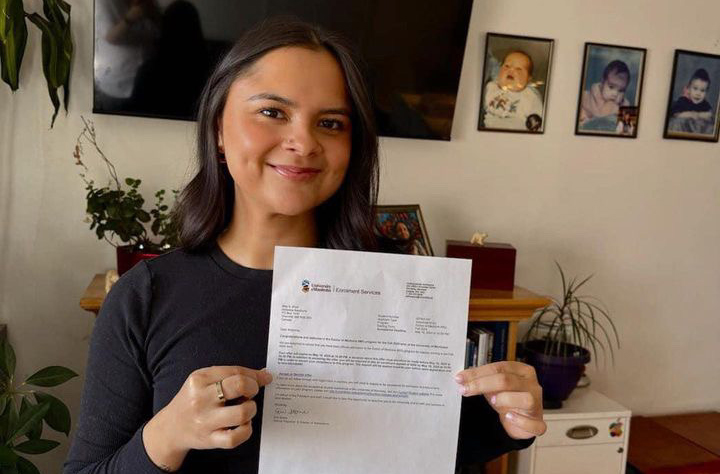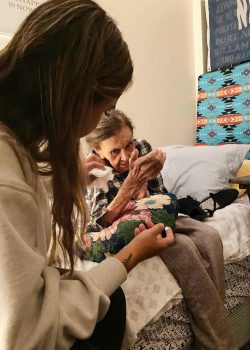
Inspired by her community, driven to make change
Antonia Kandiurin pursues medicine to make a difference in healthcare for her community
June is National Indigenous History Month. This month FKRM will celebrate, learn and acknowledge the achievements, stories and resilience of First Nations, Inuit and Métis students and staff within our faculty. This week, we’re profiling Antonia Kandiurin, a graduate of the Bachelor of Kinesiology in Athletic Therapy, pursuing her degree in medicine.
Antonina Kandiurin says finding out she was accepted into the Max Rady College of Medicine was a bittersweet and overwhelming experience. Kandiurin, who was surrounded by her family back home in Churchill, Manitoba, says she was grateful to have an outpouring of love from her family, friends and wider community.
“It’s very exciting, not only for myself or my family but also for my community,” says Kandiurin. “I was really glad that I had my family there to celebrate with me.”

Antonina sits at the bedside of her grandmother, Mary Ann Sinclair, who had encouraged Antonina to become a doctor.
Kandiurin says it was also hard because the celebration was missing her number one supporter, her grandmother, Mary Ann Sinclair, who had passed away earlier in the year. Kandiurin says that when she completed her Bachelor of Kinesiology—Athletic Therapy degree in 2020, the first thing she did when she returned to Churchill was give her grandmother her grad cap.
“She was just so happy I was home and staying,” says Kandiurin. “But she kept asking when I was going to be a doctor.”
Kandiurin says one of the last times she spoke with her grandmother, she told her, “No matter what, I’m going to be a doctor.”
Kandiurin says one of the driving forces behind her desire to get into medicine is seeing her grandmother, other family members, and the community struggle in the healthcare system.
“I think it’s important for me to acknowledge those family members who have come before me and put me in place and have given me the privilege to make change for other people.”
Kandiurin hopes to show others in her community and other northern youth that university success is possible.
“It’s important to have somebody that looks like them and has similar experiences as them, for them to be able to see they can do it too,” says Kandiurin.
For Kandiurin, it’s not just about going into medicine but also about giving back to a community that gave her so much. She says it’s important to go back and talk with youth, share your story, and be open about it.
Kandiurin says when she first came to the UM, she couldn’t “see myself there as an Indigenous woman.” Kandiurin says she struggled as she had never met anybody who looked like her following the same path. Now, returning to Winnipeg in the fall, Kandiurin says she feels rested and reconnected from her time at home and is at peace with this new journey.
“I know that I have classmates with me who have similar experiences, and many of the other Indigenous students in the upper years and my community from undergrad,” she says. “I feel a lot more grounded in knowing that there are role models who have gone through medical school and are doing amazing things.”
Kandiurin says that throughout her time from undergrad to medicine, through all the “doubt and failure throughout the years,” she wouldn’t be here if not for her family and the wider community of Churchill and York Factory, who have always believed in, supported and invested in her dreams.






